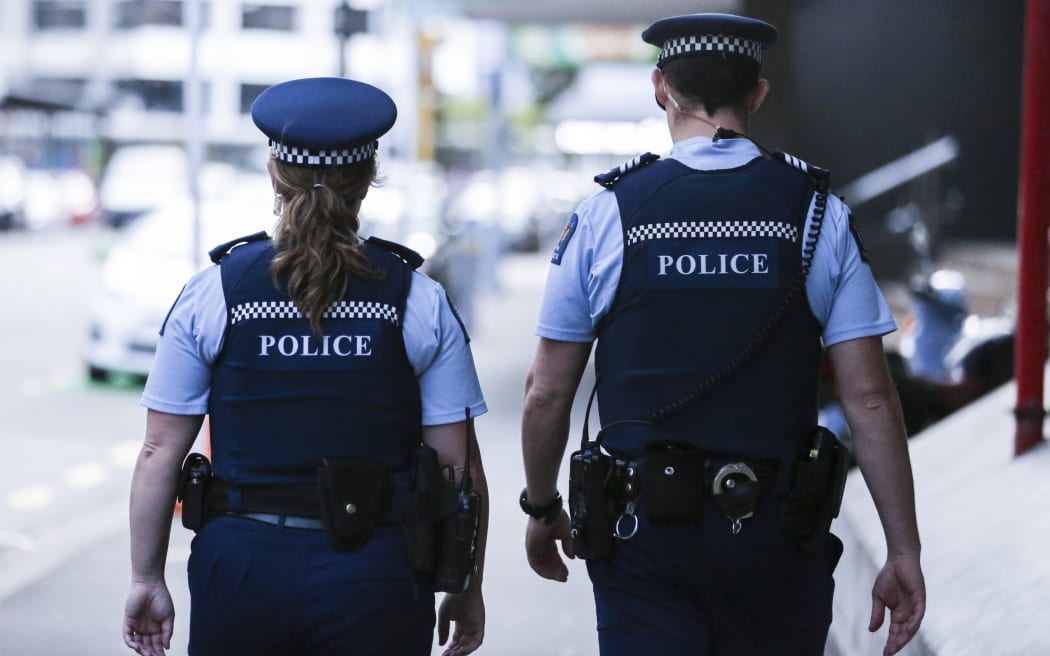
Some nurses have reported police pulling back on certain types of callouts, which they should not be phasing out until a later date. File photo. Photo: RNZ / Richard Tindiller
Unions say public health workers are confused about the police's phased withdrawal of support for mental health related requests - a year-long programme of changes that is in its fourth month of implementation.
Police announced their plan in August, which included higher thresholds for attending callouts, and plans to spend less time handing over patients who are detained under the Mental Health Act to Emergency Departments.
The plan outlined a staggered approach - for instance 60-minute ED handovers would be introduced in Phase 2: January to March 2025, reducing to 15 minute handovers by Phase 4: July to September 2025.
But in November, police told RNZ that Phase 2 would not be happening until March.
"Both Health NZ and police agreed that January was aspirational, and March is a more suitable date to deliver Phase 2.
"This is not considered a delay as it is within our original programme delivery dates," it said in an earlier statement.
HNZ told RNZ this week that Phase 2 is starting from 31 March.
Helen Garrick, who chairs the mental health section of the New Zealand Nurses' Organisation (NZNO), said there was a lack of clarity around the timelines for front-line workers.
"There's a great deal of confusion around the phases of the police rollout, what has actually rolled out already, and what is about to be rolled out," she said.
Garrick said some members have reported police pulling back on certain types of callouts, which they should not be phasing out until a later date.
"For example welfare checks are not designed to be phased out till later this year, but we have members from around the country saying there's been difficulty getting police to attend different events, and there has been some push back on attendance from police," she said.
Garrick said there also appeared to be inconsistency of the pace of the police's withdrawal in different parts of the country.
She said it had been a frustrating process.
"This does create some anxiety amongst mental health workers when they don't know whether their calls for assistance will be met," she said.
Public Service Association (PSA) organiser Alex Ward said she had also heard from members that some changes that were supposed to take effect in Phase 3 were already happening.
Ward is calling for all changes to be put on hold before there were measures in place to protect staff and patients' safety.
"These organisations - the police and Te Whatu Ora (HNZ) - are not ready to make this change,
"Phasing out some sort of support suggests you must be phasing something else in, where there is no evidence of that happening, where there is no resource for it to be done safely, this is introducing a massive uncontrolled risk to our members,
"And I would also remind you that means a risk to their patients ,and their family and ultimately the public as well," she said.
Ward said it was up to HNZ to ensure the police's phasing out of support could be done safely, but she did not think that responsibility was being upheld.
"They (HNZ) had heaps of time to prepare a way of working safely in the absence of that support [from police], increasing resources, changing the ways of working, making sure that our members are able to safely work and safely exercise their rights to refuse unsafe work...these things haven't happened," she said.
Ward said while police had assured that they would always attend if there was an offence or an immediate risk to life, she did not think that was always being followed.
"We're seeing that's not always the case, and part of that will be because of the difference in risk assessment, the police's risk assessment is in their context, whereas a mental health assessment is done by somebody who is extremely experienced and can interpret the presentation of their patients to assess risk in that way," she said.
Meanwhile, several nurses have suffered serious assaults in recent months.
A Rotorua nurse stabbed while attending a callout at a patient's house in late December, while an ED nurse at Middlemore Hospital was strangled by a patient in early January.
In late January, mental health nurses in the South Island were attacked by a patient when visiting their home for a triage assessment. One nurse had a suspected concussion and facial injuries.
HNZ said it was reviewing the incidents.
Director of specialist mental health and addiction Karla Bergquist said in a statement: "Learnings from these reviews will be shared locally and, where appropriate, nationally.
"We would caution against incorrectly suggesting the incidents are linked to the phased changes to police mental health callouts," she said.
Bergquist said HNZ was working closely with police to ensure the changes in police's support to mental health events were well implemented.
"We take a shared approach to reviewing any incidents that may be associated with these operational changes," she said.
A police spokesperson said police will always respond when there is a threat to safety or life, whether at health facilities or in the community.
They said police will weigh up what is in the best interests of the NZ public, NZ Health staff, as well as for police, in making future implementation decisions relating to the mental health response change programme.
Sign up for Ngā Pitopito Kōrero, a daily newsletter curated by our editors and delivered straight to your inbox every weekday.







